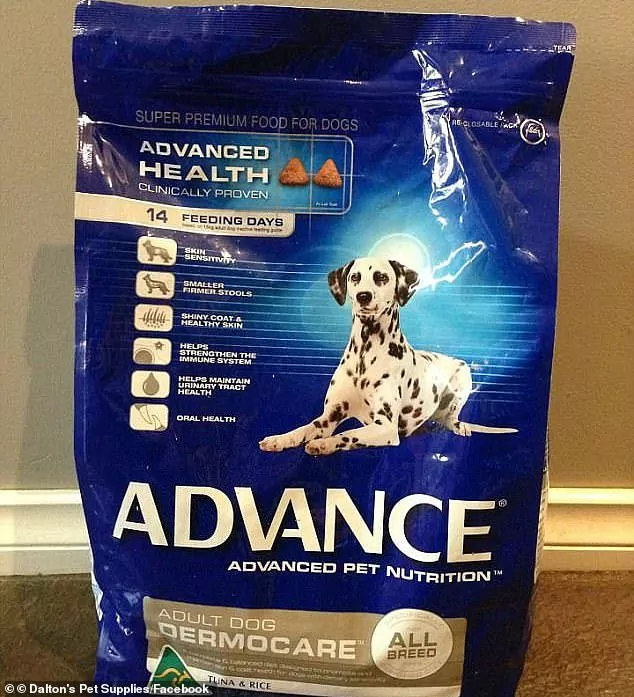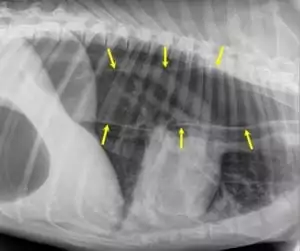Scientists from Melbourne University investigated this rare “epidemic” and confirmed that all dogs ate one particular brand of food–Advance Dermocare. They believe that the food is the source of the illness.

Australia is concerned for the well-being of dogs after more than 70 dogs across the continent have been diagnosed with megaesophagus, apparently as a result of the canines consuming a certain brand of dog food.
What is Megaesophagus?
Megaesophagus is a serious medical condition that affects dogs. The esophagus, the tube connecting to the stomach, does not function properly and food can’t be consumed normally.
The dog will regurgitate its food because it has no other way of getting it out of its chest cavity where it’s been sitting for a while. Megaesophagus is often caused by eating from a raised bowl which causes gravity to pull more water into their chest cavity which in turn prevents them from being able to swallow effectively.
In this blog post, we discuss what megaesophagus is and how you can help prevent your dog from getting this devastating disease!

The Symptoms of Megaesophagus in Dogs
The symptoms associated with megaesophagus vary, depending on the severity of the condition. Some symptoms include chronic coughing, regurgitation, and aspiration pneumonia.
The symptoms will depend on how much food is getting into your dog’s lungs when he eats or drinks too quickly. It can be very dangerous for dogs since they cannot swallow properly because their esophagus does not function normally due to this disease. However, treatment options exist that can help improve a dog’s quality of life if diagnosed early enough.
The clinical signs for dogs with megaesophagus include regurgitation and vomiting of food shortly after eating, but sometimes there may be no clinical signs at all. The time between the appearance of clinical signs and death varies from weeks to years.
What Causes Canine Megaesophagus?
There is no known cause for this disease. Although it has been suggested that megaesophagus may be caused by a neuromuscular problem or could be secondary to another condition such as esophagitis (inflammation of the esophagus), other conditions such as myasthenia gravis (an autoimmune disorder causing skeletal muscle weakness) and cervical vertebral instability which damages the brain stem should also be considered.
How to Treat Megaesophagus in Dogs
Treatment for megaesophagus includes dietary modifications such as feeding elevated, force-fed via syringe (for puppies), and tube feeding (for adult dogs).
Feeding elevated helps prevent the dog’s food from falling out of its esophagus before it reaches the stomach. Gravity keeps the food down, so moving the food up will have a similar effect.
Force-feeding involves being fed through a syringe into their mouth in an attempt to replace what they are not able to swallow on their own.
Tube feedings are used when there is a need to feed the dog with a long-term feeding tube in their abdomen. A feeding tube is put into their stomach through a surgical procedure and then attached to pumps that can be programmed with how much food needs to go in a specific time, which can help control how fast or slow the food goes into the dog’s system.
Megaesophagus is sometimes treated using medications including erythromycin, metoclopramide (a prokinetic drug), ranitidine bismuth citrate (an antacid), doxepin hydrochloride, atropine sulfate, methscopolamine bromide, neostigmine bromide, and omeprazole.
Fatal Statistics on Advance Dermocare
This condition can sometimes be fatal. According to reporters, eight of the dogs that consumed the particular dog food had to be euthanized.
The police dogs from the Victoria Police have not been spared. According to them, nine of their police dogs have been diagnosed, of which one, sadly, had to be euthanized. All of them were on the same diet, eating the same food, the Advance Dermocare.
The prevalence of megaesophagus in dogs has been reported as occurring between 1:10,000 to 1:22,000. Predisposed breeds include Basset Hounds, Bernese Mountain Dogs, and Doberman Pinschers.
If you would like to know more about problems associated with food, you can read the article on Cat Food Recalls.
Read the entire article on Advance Dermocare HERE.
The Prognosis and Outcome of Megaesophagus
The prognosis for dogs with megaesophagus is poor. The most common cause of death in these dogs is aspiration pneumonia secondary to megaesophagus.

